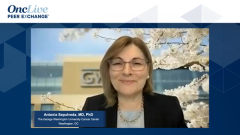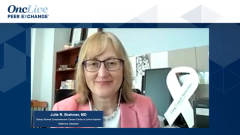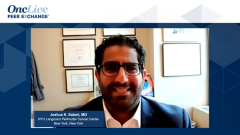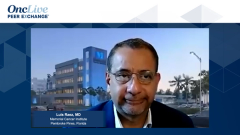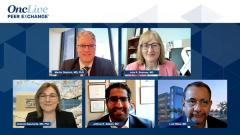
Choosing Treatments for Patients with NSCLC with Uncommon EGFR Mutations
Julie R. Brahmer, MD, discusses treatment considerations when choosing between afatinib and osimertinib in patients with NSCLC with rare EGFR mutations.
Episodes in this series

Transcript:
Martin Dietrich, MD, PhD: Dr Brahmer, maybe you can dive deeper into this difficult therapeutic dilemma between afatinib and osimertinib [Tagrisso] in the rare mutations. What are the data? What do you do in your clinic to decide one against the other?
Julie R. Brahmer, MD: For most of the data, it comes out from a small subset of [the] LUX-Lung 2 and LUX-Lung 6 [trials] where a part of that afatinib trial looked at using this drug in these uncommon mutations in exons 18 through 21. They actually subsetted these groups into group 1, which was any abnormality outside of exon 20. And in that study, afatinib had approximately a 71% response rate, a disease control rate of 84%, and an overall survival of 19.4 months. That was quite impressive. But, clearly, in these other 2 groups that were either T790-like or exon 20, there was minimal response in those groups, although the overall survival was not bad at almost 15 months for the T790-like. It’s important to be able to understand what uncommon mutations you have as well as what the sensitivity is to either first, second, or even third. And that’s the power of Google. A lot of us use MyGenome as well as other sites that are able to delve a little bit more in depth, at least to have some cell-line data of these more uncommon mutations as well.
I think there are some data of first-generation EGFR [inhibitor] such as gefitinib that do show sensitivity in some of these G719C or L861G abnormalities or mutations, where other mutations gefitinib is clearly ineffective, and obviously, both afatinib as well as gefitinib has little activity in exon 20 or even T790. I think a lot of our data come from studies looking at different large databases of genomics. There was a large retrospective trial that was published in Nature by a group out of MD Anderson and Moffitt, and they classified EGFR mutations into 4 groups: more classical-like, more like exon 21 or exon 19 deletions, where outcomes in this group really was very similar between the first-generation [and] second-generation, as well as the third-generation TKIs [tyrosine kinase inhibitors]. But then there are some less classical where it was clearly shown, at least preclinically, that afatinib was ineffective. Then we have the exon 20 insertion mutations where amivantamab and TKIs are effective, but not the second generation.
It’s important to understand where these uncommon mutations sit, what it does to that binding pocket for afatinib or osimertinib, and then decide what best. And this is the true part of where molecular tumor boards are helpful. Sometimes, even if you get a beautifully annotated report, sometimes those reports aren’t completely correct. So if it just doesn’t make sense to you, it is worth consulting either Josh via phone or others through emails to try to see whether they know of some information, as well as being able to go to some of these websites to be able to figure out the best therapy to start, rather than just empirically starting Tagrisso and seeing what happens.
Martin Dietrich, MD, PhD: That’s a very comprehensive answer to a very complex problem.
Transcript is AI-generated and edited for clarity and readability.


